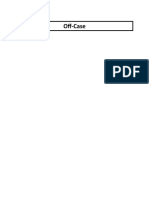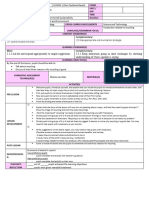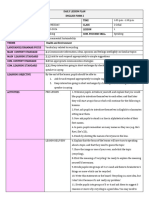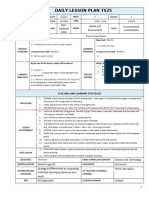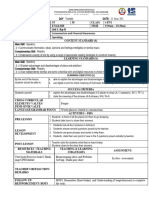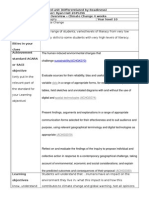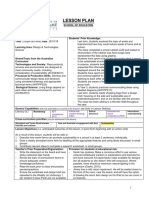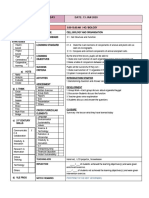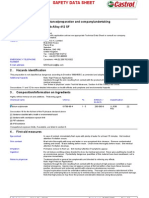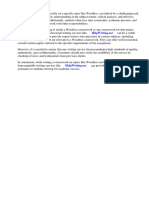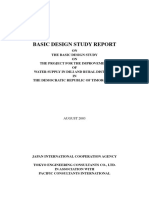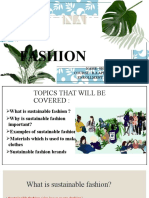0 ratings0% found this document useful (0 votes)
12 viewsLesson 1
Lesson 1
Uploaded by
NOR HASIKIN BINTI TUAH KPM-GuruThis document provides a lesson plan for a speaking lesson on environmental sustainability and recycling. The lesson objectives are for students to be able to talk about recycling and discuss at least three reasons why recycling is good. The lesson activities include introducing themselves, brainstorming recyclable items, discussing reasons recycling is important by suggesting statements on a board, and remembering the key reasons for recycling. Formative assessment and differentiation for proficiency levels is also addressed.
Copyright:
© All Rights Reserved
Available Formats
Download as DOCX, PDF, TXT or read online from Scribd
Lesson 1
Lesson 1
Uploaded by
NOR HASIKIN BINTI TUAH KPM-Guru0 ratings0% found this document useful (0 votes)
12 views1 pageThis document provides a lesson plan for a speaking lesson on environmental sustainability and recycling. The lesson objectives are for students to be able to talk about recycling and discuss at least three reasons why recycling is good. The lesson activities include introducing themselves, brainstorming recyclable items, discussing reasons recycling is important by suggesting statements on a board, and remembering the key reasons for recycling. Formative assessment and differentiation for proficiency levels is also addressed.
Original Description:
F2
Original Title
LESSON 1
Copyright
© © All Rights Reserved
Available Formats
DOCX, PDF, TXT or read online from Scribd
Share this document
Did you find this document useful?
Is this content inappropriate?
This document provides a lesson plan for a speaking lesson on environmental sustainability and recycling. The lesson objectives are for students to be able to talk about recycling and discuss at least three reasons why recycling is good. The lesson activities include introducing themselves, brainstorming recyclable items, discussing reasons recycling is important by suggesting statements on a board, and remembering the key reasons for recycling. Formative assessment and differentiation for proficiency levels is also addressed.
Copyright:
© All Rights Reserved
Available Formats
Download as DOCX, PDF, TXT or read online from Scribd
Download as docx, pdf, or txt
0 ratings0% found this document useful (0 votes)
12 views1 pageLesson 1
Lesson 1
Uploaded by
NOR HASIKIN BINTI TUAH KPM-GuruThis document provides a lesson plan for a speaking lesson on environmental sustainability and recycling. The lesson objectives are for students to be able to talk about recycling and discuss at least three reasons why recycling is good. The lesson activities include introducing themselves, brainstorming recyclable items, discussing reasons recycling is important by suggesting statements on a board, and remembering the key reasons for recycling. Formative assessment and differentiation for proficiency levels is also addressed.
Copyright:
© All Rights Reserved
Available Formats
Download as DOCX, PDF, TXT or read online from Scribd
Download as docx, pdf, or txt
You are on page 1of 1
WEEK/LESSON NO.
LESSON 1 (Non-Textbook Based) FORM 2 Bestari
DATE /
SUBJECT English
DAY
UNIT TIME
TOPIC Environmental Sustainability Duration
THEME Health and Environment
MAIN SKILL Speaking CROSS-CURRICULAR ELEMENTS Science and Technology
21ST CENTURY LEARNING Choose an item. Vocabulary related to recycling
TECHNIQUE(S) LANGUAGE/GRAMMAR FOCUS:
CONTENT STANDARD(S)
Main: Complementary:
2.1 Communicate information, ideas, opinions and feelings 2.3 Use appropriate communication strategies
intelligibly on familiar topics
LEARNING STANDARD(S)
Main: Complementary:
2.1.2 Ask for and respond appropriately to simple suggestions 2.3.1 Keep interaction going in short exchanges by checking
understanding of what a speaker is saying
LEARNING OBJECTIVE(S)
By the end of the lesson, pupils should be able to:
Talk about recycling.
Discuss at least three reasons why recycling is good.
Image related to recycling
https://treadingmyownpath.com/
FORMATIVE ASSESSMENT TECHNIQUE(S Choose an item. MATERIAL(S)
2015/06/24/im-green-but-i-dont-like-
recycling/
ACTIVITIES
Welcome pupils, introduce yourself, and explain that you would like pupils to introduce themselves to each other, and
that later they will start a topic focus which will continue for the following 4 lessons.
First, ask pupils to introduce themselves in English to classmates sitting near them.
PRE-LESSON
Now ask pupils to stand in a line in alphabetical order of their first names.
In pairs, pupils remember as many names as they can (e.g. He’s Ravi, She’s Zila).
Finish by eliciting the names of everyone in the line.
1)
Explain that the focus of the lesson will now turn to speaking about a topic, and that they need to guess the topic 7.
Show the image of recycling and elicit the topic (recycling).
Elicit the meaning of ‘recycling’: be ready to explain the meaning yourself if necessary.
Divide pupils into groups of 3 or 4 and ask them to brainstorm 5 things or more which can be recycled.
Write this statement on the board: ‘Recycling is a nice idea, but I don’t do it because it‘s not really my problem.’
LESSON Divide pupils into groups of 3 or 4 and ask them to suggest 3 reasons or more why recycling is a good idea. You may
DEVELOPMENT need to help pupils with vocabulary as you monitor.
2)
Write suggestions on the board. Again, you may need to help pupils with vocabulary.
(Possible answers relate to environmental and human benefits, and include:
it keeps the environment clean and attractive to live in
it saves many of the earth’s resources (e.g. rainforests)
it saves energy needed to make new products: (this reduces greenhouse gases and also saves resources).
Cover or erase the board and ask pupils to remember and share key reasons for recycling.
POST-LESSON
By amount of teacher’s support:
Low-proficiency pupils
DIFFERENTIATIO
- pupils complete the tasks(s) with teacher’s guidance
N High-proficiency pupils
- pupils complete the tasks(s) on their own
TEACHER’S _____ out of ______ pupils achieved the learning objectives.
REFLECTION _____ pupils were given remedial treatment.
You might also like
- Personhood - Mariam Abuikhdair (Final)Document132 pagesPersonhood - Mariam Abuikhdair (Final)Mariam AbuikhdairNo ratings yet
- KSSM English Lesson Plan For Form 2 (Sample)Document1 pageKSSM English Lesson Plan For Form 2 (Sample)Syuhada Roki100% (12)
- Ok Weir (Falling Head)Document2 pagesOk Weir (Falling Head)Homer Batalao100% (2)
- LESSON 1 Form 2 RPHDocument1 pageLESSON 1 Form 2 RPHDanial FaezNo ratings yet
- Week 4 Form2Document4 pagesWeek 4 Form2shaNo ratings yet
- Latest Form 2 Lesson Plan (Cefr/kssm English Daily Lesson Plan) RPH Bahasa Inggeris Sekolah Menengah Tingkatan 2 TerkiniDocument2 pagesLatest Form 2 Lesson Plan (Cefr/kssm English Daily Lesson Plan) RPH Bahasa Inggeris Sekolah Menengah Tingkatan 2 Terkinierfolg.prominence100% (1)
- Form 2 English Lesson Plan Ts25: Image Related To RecyclingDocument3 pagesForm 2 English Lesson Plan Ts25: Image Related To RecyclingAries QiqiNo ratings yet
- Lesson 2Document2 pagesLesson 2NOR HASIKIN BINTI TUAH KPM-GuruNo ratings yet
- The Students Use? Be Specific) Textbook (School Book) Pens (Markers) Class?) Check The Projector Is Working Make The Tables in GroupsDocument2 pagesThe Students Use? Be Specific) Textbook (School Book) Pens (Markers) Class?) Check The Projector Is Working Make The Tables in Groupsapi-356438163No ratings yet
- Form 2 Lesson Plan TS25Document20 pagesForm 2 Lesson Plan TS25Ct NurNo ratings yet
- Form 2 Lesson 1 SpeakingDocument2 pagesForm 2 Lesson 1 SpeakingINTAN FARVIN BINTI MOHAMED ELIAS MoeNo ratings yet
- Unit 6 MoneyDocument39 pagesUnit 6 MoneyMAISARAH AZYAN BINTI MOHAMAD KPM-GuruNo ratings yet
- LESSON 3 Form 2 RPHDocument2 pagesLESSON 3 Form 2 RPHDanial FaezNo ratings yet
- LESSON PLANS FORM 2 Unit 6 MoneyDocument38 pagesLESSON PLANS FORM 2 Unit 6 MoneyYuga Gayu67% (6)
- WEEK 2 Les 2Document5 pagesWEEK 2 Les 2Niza IsmailNo ratings yet
- Form 2 Lesson 3 ReadingDocument2 pagesForm 2 Lesson 3 ReadingmohanaaprkashNo ratings yet
- Lesson Plan Cefr Form 2. 2020docxDocument112 pagesLesson Plan Cefr Form 2. 2020docxFarahaini Mohd Perang100% (1)
- Raymond Kallie-Lessonplan2finalDocument4 pagesRaymond Kallie-Lessonplan2finalapi-706959969No ratings yet
- Lesson 78Document1 pageLesson 78Khairul HafiziNo ratings yet
- Raymond Kallie-Lessonplan1finalDocument4 pagesRaymond Kallie-Lessonplan1finalapi-706959969No ratings yet
- Lesson 26Document1 pageLesson 26farah famiNo ratings yet
- Week 6 Form2Document4 pagesWeek 6 Form2shaNo ratings yet
- 2a Mon 18.3.24Document2 pages2a Mon 18.3.24khairimohd1045No ratings yet
- Instructional Video and Lesson PlanDocument3 pagesInstructional Video and Lesson Planapi-616182743No ratings yet
- Wednesday Year 2 0810-0910 English Language: Class/ Time/ Subject Content ImpactDocument2 pagesWednesday Year 2 0810-0910 English Language: Class/ Time/ Subject Content ImpactMac LyneNo ratings yet
- Year 3 Civic Lesson Plan (June-Mutual Respect) : By:MissashDocument1 pageYear 3 Civic Lesson Plan (June-Mutual Respect) : By:MissashPavvy NathanNo ratings yet
- Year 3 Civic Lesson Plan (June-Mutual Respect) : By:MissashDocument1 pageYear 3 Civic Lesson Plan (June-Mutual Respect) : By:MissashPavvy NathanNo ratings yet
- Secondary Scheme of Work Form 2Document163 pagesSecondary Scheme of Work Form 2Fariha RismanNo ratings yet
- Form 2 Lesson 3 ReadingDocument2 pagesForm 2 Lesson 3 ReadingINTAN FARVIN BINTI MOHAMED ELIAS MoeNo ratings yet
- AIW Unit Plan - Ind. Tech ExampleDocument4 pagesAIW Unit Plan - Ind. Tech ExampleMary McDonnellNo ratings yet
- RPH Form 4 WEEK 2Document4 pagesRPH Form 4 WEEK 2Matthew MantraNo ratings yet
- 2 DinamikDocument2 pages2 Dinamikazahraazhar06No ratings yet
- Challenge - Stage 3 - Can We Use Less - Example Language Support - tcm142-658584Document6 pagesChallenge - Stage 3 - Can We Use Less - Example Language Support - tcm142-658584Dharani SathishkumarNo ratings yet
- Bukandala E/S Roderick M. Ruam Science: School Grade: Teacher Learning Area: Date / Time Quarter: I. ObjectivesDocument2 pagesBukandala E/S Roderick M. Ruam Science: School Grade: Teacher Learning Area: Date / Time Quarter: I. ObjectivesTheKnow04No ratings yet
- Tuesday (01 Jan 2019)Document3 pagesTuesday (01 Jan 2019)Hasanah NaserNo ratings yet
- 2 Cekal Minggu 1Document2 pages2 Cekal Minggu 1azahraazhar06No ratings yet
- THURSDAYDocument5 pagesTHURSDAYg-86066535No ratings yet
- Week 2 THURS 2EDocument2 pagesWeek 2 THURS 2Eg-92363245No ratings yet
- Modified Lesson Plan OneDocument5 pagesModified Lesson Plan Oneapi-548616390No ratings yet
- Mon 28 OctDocument3 pagesMon 28 Octg-88181552No ratings yet
- eRPH F4 - Unit 1Document26 pageseRPH F4 - Unit 1khairunnisa binti harunNo ratings yet
- English Language 1 (NTB) Health and Environment Speaking: 21 Century Learning ActivityDocument1 pageEnglish Language 1 (NTB) Health and Environment Speaking: 21 Century Learning ActivitySabrina PetrusNo ratings yet
- Form 3 Lesson 1Document1 pageForm 3 Lesson 1Ami Amnaida HamidNo ratings yet
- Week 25Document24 pagesWeek 25NURBAHIYYAH SYAZWANI BINTI ZAINURIN KPM-GuruNo ratings yet
- Week: 2 Day: Monday DATE: 6 JAN 2020Document22 pagesWeek: 2 Day: Monday DATE: 6 JAN 2020Nurul AtirahNo ratings yet
- Based On Annex 2B.6 To Deped Order No. 42, S. 2016 Daily Lesson Plan Senior High School Balanacan National High School Melody A. Magahis-MendozaDocument3 pagesBased On Annex 2B.6 To Deped Order No. 42, S. 2016 Daily Lesson Plan Senior High School Balanacan National High School Melody A. Magahis-MendozaMelodyNo ratings yet
- English Form 2Document13 pagesEnglish Form 2Subramaniam PeriannanNo ratings yet
- RPH Week13 English F4 F5Document7 pagesRPH Week13 English F4 F5Mohd Azizul KhairuddinNo ratings yet
- Tiered UnitDocument12 pagesTiered Unitapi-296231693No ratings yet
- Presentation of NAVIO Show Students The ReadingDocument14 pagesPresentation of NAVIO Show Students The ReadingEsteban Malaquias ChavezNo ratings yet
- Co1-Trends 2022-2023Document4 pagesCo1-Trends 2022-2023Editha RobillosNo ratings yet
- 5 LILING LESSON PLAN Science 4 FINALDocument5 pages5 LILING LESSON PLAN Science 4 FINALedelyn jane tundayNo ratings yet
- Daily Lesson Plan FM 1, FM 2Document2 pagesDaily Lesson Plan FM 1, FM 2Yusnita YusofNo ratings yet
- Y4 Civic-June-Mutual PracticesDocument1 pageY4 Civic-June-Mutual PracticesInthumathy ThanabalNo ratings yet
- Lesson Plan EnglishDocument4 pagesLesson Plan EnglishSalvation NkokosaNo ratings yet
- Lesson Plan: Design and TechnologiesDocument6 pagesLesson Plan: Design and Technologiesapi-451062196No ratings yet
- Este LPDocument5 pagesEste LPapi-379108487No ratings yet
- KSSM English Lesson Plan For Form 2 SampleDocument1 pageKSSM English Lesson Plan For Form 2 SampleB3KIDZNo ratings yet
- Photo ArgumentDocument10 pagesPhoto Argumentapi-285168420No ratings yet
- Week: 3 Day: Monday DATE: 13 JAN 2020: Teaching Aids ReflectionDocument20 pagesWeek: 3 Day: Monday DATE: 13 JAN 2020: Teaching Aids ReflectionNurul AtirahNo ratings yet
- Energy Transition Mechanism in Indonesia-Seminar ETM-ASEANDocument29 pagesEnergy Transition Mechanism in Indonesia-Seminar ETM-ASEANTiara Sy100% (1)
- VisionIAS Quick Revision Material December 2024 Drainage Pattern and TypesDocument15 pagesVisionIAS Quick Revision Material December 2024 Drainage Pattern and TypesJayant SharmaNo ratings yet
- Reducing Cost of Solar With In-Line Fuses: White PaperDocument4 pagesReducing Cost of Solar With In-Line Fuses: White PaperMiguel GarzaNo ratings yet
- Ammoor - PHC Kayakalp Checklist 27.12.2017Document34 pagesAmmoor - PHC Kayakalp Checklist 27.12.2017Navin Chandar100% (1)
- Unigwe and Egbueri 2021Document22 pagesUnigwe and Egbueri 2021Unigwe Chinanu OdinakaNo ratings yet
- Environmental Management: A Guide To Subject Selection For O Level StudentsDocument31 pagesEnvironmental Management: A Guide To Subject Selection For O Level StudentsPathak RkNo ratings yet
- OUTPUT3 - REG - Learning Plan - With Assessments - ConsolidatedDocument18 pagesOUTPUT3 - REG - Learning Plan - With Assessments - Consolidatedjayson babaranNo ratings yet
- Exam 3 NaRMDocument6 pagesExam 3 NaRMseidNo ratings yet
- Case Studies of MPA Networks: Cebu Island, Philippines (Marine Protected Areas)Document6 pagesCase Studies of MPA Networks: Cebu Island, Philippines (Marine Protected Areas)CEDARS_archiveNo ratings yet
- Directions: Read Each Item Carefully. Encircle The Letter of The Correct Answer For Each QuestionDocument6 pagesDirections: Read Each Item Carefully. Encircle The Letter of The Correct Answer For Each Questionedwin dumopoyNo ratings yet
- Bricks: LT Col G M Faruque Ce Dept, MistDocument32 pagesBricks: LT Col G M Faruque Ce Dept, MistRj 30No ratings yet
- Chapter 4. Wind EnergyDocument19 pagesChapter 4. Wind Energybouzaaymen5No ratings yet
- Res4Med - Atc 2016 "Integration of Renewable Energy Solutions in The Electricity Markets"Document12 pagesRes4Med - Atc 2016 "Integration of Renewable Energy Solutions in The Electricity Markets"NassimNo ratings yet
- Mahama Key-Policies-brochure 240823 103150Document32 pagesMahama Key-Policies-brochure 240823 103150The Independent GhanaNo ratings yet
- 05 Project Safety PlanDocument32 pages05 Project Safety Planrudiawan100% (3)
- Erosion and DepositionDocument36 pagesErosion and DepositionNadia AlvaradoNo ratings yet
- HEMP For Hse WorkshopDocument11 pagesHEMP For Hse WorkshopRodrigo CohitmingaoNo ratings yet
- 1 - Identification of The Substance/preparation and Company/undertaking Molub-Alloy 412 SFDocument4 pages1 - Identification of The Substance/preparation and Company/undertaking Molub-Alloy 412 SFwillowwood666No ratings yet
- Assessment of Urban Solid Waste Management Systems For Industry 4.0 Technology Interventions and Circular EconomyDocument13 pagesAssessment of Urban Solid Waste Management Systems For Industry 4.0 Technology Interventions and Circular Economymeyirim571No ratings yet
- Woodlice CourseworkDocument7 pagesWoodlice Courseworkf5ddpge2100% (2)
- Basic Design ReportDocument66 pagesBasic Design ReportmuhidNo ratings yet
- 27-Zero Liquid Discharge-07-03-2023Document9 pages27-Zero Liquid Discharge-07-03-2023Back upNo ratings yet
- 03 - TDS Gazpromneft Diesel Extra 10W-40,15W-40,20W-50 - EngDocument2 pages03 - TDS Gazpromneft Diesel Extra 10W-40,15W-40,20W-50 - EngCecilia RuizNo ratings yet
- MSDS - MPS-FDocument6 pagesMSDS - MPS-Fazam RazzaqNo ratings yet
- Shakshi OepptDocument24 pagesShakshi Oepptshakshi dhamNo ratings yet
- 752CA200 Cosette ToiletDocument1 page752CA200 Cosette ToiletCharles ThiviergeNo ratings yet
- F1 Term 2 Grammar Practice IIDocument2 pagesF1 Term 2 Grammar Practice IICharlotteNo ratings yet
- Tle10 Afa Agricrop q1 Mod3 Undertakeagronomiccropworkasdirected v5Document32 pagesTle10 Afa Agricrop q1 Mod3 Undertakeagronomiccropworkasdirected v5Jelly Ace Almond TeaNo ratings yet
